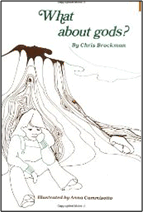What about gods?
Children's story on letting go of make-believe
by Chris Brockman
 This marvelous little book came from a very special individual out of a milieu in the young libertarian movement in Michigan in the mid-1970s. There was a certain orthodoxy to that milieu; I remember Chris and his wife Julie
seemed on the 'free spirit' end of the general 'rational-libertarian' structure of our sociology at the time.[1]
Chris and Julie were always more antiwar and anticorporate than most of us in those days, and had solid secular-humanist credentials. We in the secular Objectivist-libertarian center had read and heard all the excellent intellectual refutations of the concept of God.[2] I, personally, manifested egoic arrogance in my understanding, to the point of minimizing more humane perspectives. This marvelous little book came from a very special individual out of a milieu in the young libertarian movement in Michigan in the mid-1970s. There was a certain orthodoxy to that milieu; I remember Chris and his wife Julie
seemed on the 'free spirit' end of the general 'rational-libertarian' structure of our sociology at the time.[1]
Chris and Julie were always more antiwar and anticorporate than most of us in those days, and had solid secular-humanist credentials. We in the secular Objectivist-libertarian center had read and heard all the excellent intellectual refutations of the concept of God.[2] I, personally, manifested egoic arrogance in my understanding, to the point of minimizing more humane perspectives.
Still, after my due compulsive mental activity, I was receptive to Chris's book from the beginning. Indeed, it represented to me a large step in constructively getting 'out of my own head' and exhibiting more sensitivity to the largely more emotional perspectives that real people tend to hold about God and many other subjects. It helped me become a better communicator on a person-to-person level.
What about gods? (I'm maintaining the author's preference for lower initial-capitalization of the word gods in a title) is a short book designed for children or for families struggling with the age-old issue of how to provide their kids a haven for moral growth without hampering them cognitively with the logical absurdities of conventional theistic religion. It's unfortunate that most people still cannot see how one can become an ethical, caring person without some kind of belief in a supernatural being; it's a measure of the success of conventional religion and the unhealthful ideas therein that so many people do not view rational philosophy as humanitarian. Colloquially, "if you don't believe in God, you aren't going to be a good person..." because there isn't anyone there to punish you for being bad.
There are so many flaws, implicit and explicit, in that theistic view it requires volumes to dispel them all. I'll just point to the
outrageousness of thinking that rationality => immorality, and the corollary idea that moral behavior is unrelated to successful human life. But let's not get bogged down in analysis. Instead let the book speak, for example, of the hugely destructive concept of original sin:
Some religions each
that people are evil when they are born.
Many teach that people can't help
being evil
all their lives if they don't ask their god
to forgive them for being human beings. Some
religions have a ceremony called baptism that
people go through in order to be forgiven for
being born human beings.
But people are not all bad or all good. Everyone does
good things, sometimes bad things, and many things
that are neither bad nor good. People would do far fewer bad
things if they would decide for themselves what is good and
what is bad, and think before they do things.
Which is a sentiment that produces far less traumatized children, for one thing. How can it be helpful to a child's moral development to be told that it's hopeless, that he's a bad person out of the gate. That he needs to feel guilty for being bad, and that the only way he can make up for being such a bad person is to give himself up to a phantasm who serves as his big brother. How messed up is that? And, oh, junior, if you're having a hard time understanding what to do to be good, then let Father Dingaling spend a few moments alone with you in his heavenly loft. No, I'm not picking on the Catholics, just stating that such murky moral foundations as original sin lead easily to violations by sick, opportunistic, pious criminals.
If only we lived in a culture where hundreds of books such as What about gods? had been written, and they'd all become New York Times best sellers! Sure that would help on the simple rationality front when it comes to supernatural beings. Another alarming thing, however, is that so many who discard the concept of God(s) set up instead the State or the government a as a deity or entity we must obey and worship... and for equally
silly reasons. [The State as a representation of everyone has no existence: it is really only a group of men, like the leaders of a church. Like the Wizard of Oz.] It would be wonderful if Mr. Brockman or one of his intellectual descendants would write a book, What about the State?.
Unfortunately, there isn't any significant treatment in What about gods? of other forms of superstition-based entities. Though it's more or less implied by passages such as the following:
Many people have
been killed because they
believed in different gods,
or even because they belonged
to different religions that believe in the
same gods. Thousands of people died when
soldiers who belonged to the Christian religion
attacked and killed people who belonged to the
Moslem
religion. These attacks were called the
Crusades. The Crusades were considered very
holy and very good by the Christians because
they were trying to 'save' the Moslems from
practicing the wrong religion.
Anticipating the attacks by the Neocons (supported by millions of duped booboisie) on Iraq and the vengeance bombing of Afghanistan (following the false-flag state-terror attacks of 9/11). But my point is really the socialist-fascist nation-states in general; they're all made into 'gods' to live for and die for, but what's really happening is some men are working a racket of superstition and lies on the great mass of others who don't think well.
So if war is the health of god(s) it is also the health of the state(s).
Brockman has performed a great public service by writing this book. His simple formulations and kindhearted demeanor will become iconic in the years ahead as we move into the New Paradigm of reason and nonaggression: per my FLOW fellowship: inner peace, outer peace, and abundance. So long as people continue to bear and raise children, the younglings' enlightenment is of paramount importance. Indeed, it's a marvel to me that humanity has lasted this long with the toxic notions of conventional religion. [Note, I stop short of advocating that parents not send their children to Sunday School or church. Jesus, for example, properly understood and conveyed, can be a genuine source of spiritual learning and moral development; so much depends on the people and the context.]
Anyway, great culture-enhancing work, spread the word!
By the way, the illustrations in the book by Anna Cammisotto are superb, what a marvelous talent, and conducive to the textual points.
[1] It's hard to convey the excitement that lay in the popular center of those early libertarian (and Libertarian) years.
We were few in number, and those attuned to the ideas of Ayn Rand tempered with idealistic political action knew one another... through pamphleteering, early magazines such as Reason out of MIT, books (especially those of Rand, prime-time Murray Rothbard, Robert Heinlein, early life-extension futurists such as Robert Ettinger, and so on), and general discussion, most of it occurring on college campuses as a counterforce to the (largely false-flag, left-statist) antiwar juggernaut. We—let's just call us the Objectivist-libertarians—were too young and too brainwashed by the corporatists of the era to realize we belonged at the head of the antiwar movement, and too lacking in social acceptance within the antiwar movement to be listened to, anyway.
[2]
To list some of the main great arguments of the day that I remember: Man and His Gods, by Homer W. Smith; God and Philosophy, by Anthony Flew; The Case against God, by George Smith; and the "First Cause Argument" short column by Nathaniel Branden in The Objectivist Newsletter, May 1962.
###
2011 September 05
Copyright © Brian Wright | The Coffee Coaster™
Chris Brockman | What about gods? | Theism | Atheism | Mythology
|





